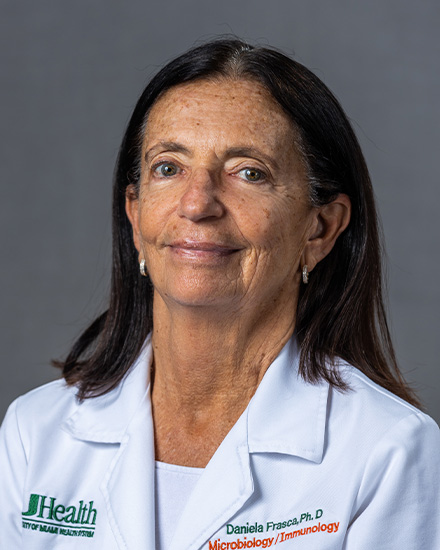
Roles
Research Associate Professor
-
Biography
Born in Italy, I graduated from the University of Rome “La Sapienza” with a BSc University degree in Biology cum laude in May 1980. My scientific career started after my graduation studying the possibility to reconstitute T cell function of mice immunocompromised by aging and/or irradiation using immunoregulatory molecules, such as thymic hormones (thymosin-a1) and cytokines (synthetic peptides of IL-1ß). This was a very active area of investigation in the ‘80s, with the interest raised up after the Cernobyl accident. For my discoveries, I was awarded with the Scientific Prize Roussel in 1986 and also interviewed by “The Globe and Mail” during the 6th International Congress of Immunology.
In 2001 I came to the US. I joined the laboratory of Dr. Blomberg in the Department of Microbiology and Immunology and started working on B cell immunosenescence. I measured the effects of aging on antibody responses of mouse and human B cells and I identified the molecular mechanisms responsible for the decreased humoral immunity observed during aging.
In 2009, I received my PhD from the University of Rome “La Sapienza” for these studies performed in Miami.
In 2010 I became Research Assistant Professor. I continued my studies on B cell immunosenescence primarily focusing on influenza vaccine responses in individuals of different ages. As a natural extension of my previous discoveries I started to study the mechanisms by which obesity induces defects in B cells similar to those induced by aging. The possibility to obtain large amounts of discarded adipose tissue from a high number of individuals undergoing weight reduction surgeries gave me the great occasion to identify and characterize the mechanisms through which the adipose tissue drives dysfunctional humoral immunity in individuals with obesity. This is currently my primary research interest.
In February 2020 I became Research Associate Professor. During the COVID-19 pandemic I continued my studies on the effects of obesity on humoral immunity and I started evaluating the effects of obesity on the quantity and quality of SARS-CoV2-specific antibodies secreted in the serum of individuals with obesity.
I have published >160 publications including book chapters. My research has continuously been supported by grants from the NIH. -
Education & Training
Education
-
Honors & Awards
No result found
-
Teaching Interests
After the success of the MIC 460 and of the MIC 775 classes, my goal is to continue teaching these classes in which motivated students participate with great interest in joining my research
topics. -
Research Interests
One major focus of my research has been the characterization of the age-associated defects in T and B lymphocytes in mice and humans responsible at least in part for the reduced response of elderly individuals to infections and vaccines. The defects identified include the impairment in the ability of B cells to undergo class switch recombination and somatic hypermutation, two crucial processes involved in the generation of high affinity, protective antibodies.
More recently, the focus of my research was to identify and characterize the effects of obesity on antibody responses. Obesity, similar to aging, induces defects in humoral immunity. More importantly, obesity accelerates age defects in B cells by inducing systemic and B cell intrinsic inflammation, leading to reduced protective antibody responses to infections and vaccines and increased secretion of pathogenic autoimmune antibodies. This strongly depends on the composition, as well as on the metabolic profile, of the B cell pool of individuals with obesity, with higher frequencies of pro-inflammatory B cell subsets, which are characterized by an hyper-metabolic phenotype needed to support secretion of inflammatory markers and of pathogenic autoimmune antibodies. My recently published work has revealed the metabolic phenotypes of B cells isolated from young and elderly individuals with obesity, HIV or from elderly individuals with type-2 diabetes.
To better understand how obesity accelerates B cell immunosenescence, my studies have characterized the human obese adipose tissue obtained from individuals undergoing weight reduction surgeries, and we evaluated, phenotypically and functionally, the different immune cell types that infiltrate the tissue, with a special interest on B cells. We have shown that the human adipose tissue, which increases in size with aging, contributes to the secretion of autoimmune antibodies many of which are also present in the plasma of elderly individuals, suggesting that the adipose tissue may contribute to pathogenicity during aging. We have identified several molecules and mechanisms responsible for the local release of “self” antigens, induction of class switch and production of autoimmune antibodies, the specificity of which has recently been characterized.
Full list of my published work is available at
https://www.ncbi.nlm.nih.gov/myncbi/daniela.frasca.2/bibliography/public/ -
Publications
Disclaimer: The information presented in this section has been consolidated using AI and machine learning technologies. While every effort has been made to ensure accuracy, errors may occur. If you identify any inaccuracies, please use this link to inform our data team. Your feedback is greatly appreciated and helps us improve the quality of our content.
-
Professional Activities
No result found

